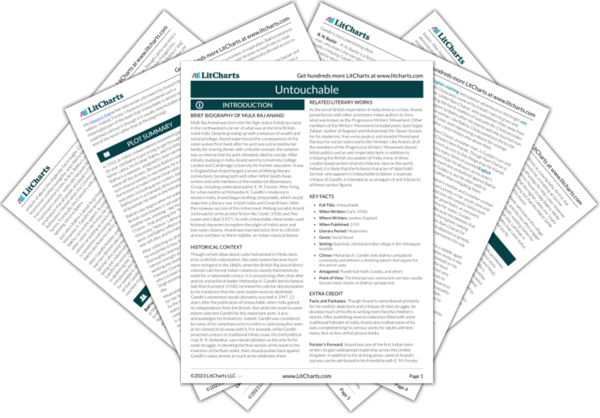Scavenger/Sweeper Quotes in Untouchable
[Bakha] had wept and cried to be allowed to go to school. But then his father had told him that schools were meant for the babus, not for the lowly sweepers. He hadn’t quite understood the reason for that then. Later at the British barracks he realized why his father had not sent him to school. He was a sweeper’s son and could never be a babu. Later still he realized that there was no school which would admit him because the parents of the other children would not allow their sons to be contaminated by the touch of the low-caste man’s sons. How absurd, he thought, that was, since most of the Hindu children touched him willingly at hockey and wouldn’t mind having him at school with them. […] These old Hindus were cruel. He was a sweeper, he knew, but he could not consciously accept that fact.
“Why are we always abused? The santry inspictor and the sahib that day abused my father. They always abuse us. Because we are sweepers. Because we touch dung. They hate dung. I hate it too. That's why I came here. I was tired of working on the latrines every day. That's why they don't touch us, the high castes. […] For them I am a sweeper, sweeper - untouchable! Untouchable! Untouchable! That's the word! Untouchable! I am an untouchable!”
[Bakha] walked away without looking back, lest he should prove unequal to the unique honor that the Hindu had done him by entrusting him with so intimate a job as fetching coal in his clay basin. For a moment he doubted whether Charat Singh was conscious and in his senses when he entrusted him with the job. ‘He might be forgetful and suddenly realize what he had done. Did he forget that I am a sweeper?’ […] He was grateful to God that such men as Charat Singh existed. He walked with a steady step, with a happy step, deliberately controlled […]. It was with difficulty, however that he prevented himself from stumbling, for his soul was full of love and adoration and worship for the man who had thought it fit to entrust him, an unclean menial, with the job.
How [Bakha] had smarted under the pain of that callousness and cruelty. Could [Lakha] be the same father who, according to his own version, had gone praying to the doctor for medicine? Bakha recalled he had not spoken to his father for days after that incident. Then his grief about his unhappy position had become less violent, less rebellious. He had begun to work very hard. It had seemed to him that the punishment was good for him. For he felt he had learned through it to put his heart into his work. He had matured. He had learned to scrub floors, cook, fetch water […]. And in spite of the poor nourishment he got, he had developed into a big strong man, broad shouldered, heavy hipped, supple armed, as near the Indian ideal of the wrestler as he wished to be.
Bakha felt thrilled to the very marrow of his bones. That the Mahatma should want to be born as an outcaste! That he should love scavenging! He loved the man. He felt he could put his life in his hands and ask him to do what he liked with it. For him he would do anything. He would like to go and be a scavenger at his ashram.
‘When the sweepers changed their profession, they will no longer remain Untouchables. And they can do that soon, for the first thing we will do when we accept the machine, will be to introduce the machine which clears dung without anyone having to handle it - the flush system. Then the sweepers can be free from the stigma of untouchability and assume the dignity of status that is their right as useful members of a casteless and classless society.’












